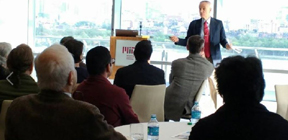
BOSTON: Boston Massachusetts Institute of Technology (MIT) arranged its MIT-India Fall Reception and Book Talk with Professor Ross Bassett of North Carolina State, Raleigh on Sept 29 AT the Samberg Center of Sloan School of Management, Cambridge, MA.
Enthusiastic faculty, staff, students and members from Greater Boston community filled the hall.S. P. Kothari, Professor of Accounting and Finance at the Sloan School of Management, welcomed the audience and introduced Prof. Ross Bassett. He said that Prof. Bassett did extensive research using students’ information from MIT Commencement Programs that listed the name, hometown of every graduate. This allowed him to construct a database of every Indian who graduated until 2000 with roughly 1300 graduates from the start and wrote a book titled, ‘The Technological Indian-MIT and India: A130-Year History.’
Prof. Bassett said that in his book, The Technological Indian, he shared his research on how Indians looked to MIT to an extraordinary extent in their quest for technological development, while also focusing on the long history of Indians at MIT, the connection with Gandhi, and the development of the Indian IT Industry. He also stated that the question that motivated this study was how did Indians come to be such prominent engineers? And how did technological connections develop between India and the United States?
According to Prof Bassett, a study of Indian graduates of MIT shows us new perspectives on the history of Indian technology and business and puts major figures like Bal Gangadhar Tilak, Mahatma Gandhi and G. D. Birla in Indian history in a new perspective. For over 130 years a group of Indians has looked to MIT seeking resources for technological transformation of the nation, of businesses, of themselves, and including today’s “high tech” Indians as well. Keshav Malhar Bhat from Poona attended MIT in 1882 and no Indian attended for another 20 years.
He narrated that in the 1920s and 1930s more Indians who went to MIT came from Gujarat than from anywhere else in India because of connections between Mahatma Gandhi and MIT through his longtime associate Devchand Parekh. Also a number of young men associated with Gandhi went to MIT.
Devchand came to United States in 1893 due to his drive for industrial development. In Devchand’s family one son-in-law, two sons, three nephews, and one grandson graduated from MIT. Trikamlal Shah, the Registrar of Gujarat Vidyapith, who married the daughter of Devchand, went to MIT in 1926.
Later, Bal Kalekar, the son of Kaka Kalekar wanted to study at MIT. He wrote to GD Birla asking for his support – Bassett reveals that Gandhi himself edited Bal’s letter, even though the life was not easy for these early students at MIT. By 1930s, when Anant Pandya graduated from MIT there was a larger group of Indian students who had an active social life with one another.
Prof. Bassett thought that even though Nehru advocated engineering and industrialization in India, Gandhi had some core values associated with modern industrial society such as time consciousness, work ethic, numeracy, the primacy of the organization. That is why Richard Gregg, Economics of Khaddar, 1928, described, “Mr. Gandhi seems to be, in effect, a great industrial engineer.
“He further said that Indian graduates of MIT played a central role in the development of India’s IT industry (Tata Consulting Services (TCS), Datamatics, Patni Computer Systems, Infosys (indirectly)) that does business with foreign countries.
His lecture was followed by a brief Q & A session where the audience raised a few interesting questions to Prof Bassett and got satisfactory answers from him. Prof. Kothari not only moderated the session but also thanked all the audience for coming to learn more about the relationship of MIT and India and how they became a technological force to reckon with.
“It was really fascinating to listen to the leading technological historian, Professor Ross Bassett who used a unique database of every Indian who graduated from MIT. We felt very proud about the impact a group of Indians who went to MIT had on our country’s technology, business, and development in different fields,” said Mrs. Vasudha Kothari.
Geetha Patil






